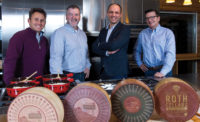Much has changed for kefir producer Lifeway Foods Inc. since Russian immigrant Michael Smolyansky founded the company in his basement in 1986. Michael Smolyansky died in 2002, and his children, Julie Smolyansky and Edward Smolyansky, now lead the company. Julie Smolyansky is president and CEO, while Edward Smolyansky is chief operating officer. (At the time she took the reins, Julie Smolyansky was only 27, making her the youngest female CEO of a publicly held U.S. company.)
Lifeway Foods has also grown its kefir market share over the years by acquiring key competitors — Helios Nutrition and Fresh Made Dairy. The Morton Grove, Ill.-based company said it is now the No. 1 producer of the fermented beverage in the United States, operating three processing facilities — in Morton Grove, Philadelphia and Waukesha, Wis. (see “Operation Revival,”). Its products are sold within the grocery channel and in select club stores, as well as in the foodservice and hospitality channels.
In recent years, Lifeway Foods has expanded its kefir lineup to include innovative products such as ProBugs kefir for kids, BioKefir shots and even frozen kefir. Net sales of its Lifeway brand and other products (the company also leverages its capacity to produce some private label items) reached $118.9 million in 2017.
Throughout all of the changes, however, Lifeway Foods has stayed true to its mission: to provide the best in probiotic and nutritious foods, to improve the health of its customers and to leave the world a better place.
Paying more than lip service
The healthy body/healthy planet focus is something Julie Smolyansky takes very seriously.
“I believe at Lifeway we are all healers,” she said. “We are all part of a bigger picture of healing ourselves, our community, our customers.”
Almost half of the company’s products are organic, Edward Smolyansky noted. In addition to containing digestion- and immunity-boosting probiotics, the products are rBST-free and hormone-free, and they are made with all-natural ingredients.
Lifeway Foods’ kefir products also come with good news for lactose-intolerant consumers.
“We’ve always said our product is naturally up to 99% lactose-free because of the way it’s fermented,” Edward Smolyansky said. “Independent lab results that we post on our website show the result of that fermentation process.”
Lifeway Foods also invests in innovation geared toward a healthy environment.
“I think as manufacturers, we have a responsibility to do as little harm as we are able to with the Earth, so we’ve taken big steps,” Julie Smolyansky said.
Those steps include switching to plant-based plastics for all bottles and cups, as well as buying renewable energy credits to offset the company’s energy use.
“Consumers are voting with their wallets, and they’re making food choices based on how manufacturers are making that food, how thoughtful they are in sourcing their ingredients, and how they express that thoughtfulness,” Julie Smolyansky said. “I think those are really important factors that millennials especially consider.”
Committed to innovation
Although kefir remains king for Lifeway Foods, the company is no one-trick pony when it comes to product offerings. In recent years, it has invested significantly in innovation outside the kefir subcategory.
Lifeway Foods’ offerings now include farmer cheese, flavored sparkling elixirs, skyr (high-protein Icelandic-style yogurt) and supplements — all boasting health-promoting probiotics. The company also announced the introduction of spoonable kefir in a cup.
“We’re the category leader in drinkables,” Edward Smolyansky said. “It’s just a natural evolution.”
And soon to be launched is the Lifeway Plantiful line of plant-based probiotic smoothies. The line is dairy-free, gluten-free and vegan, meshing with current trends, he noted.
Lifeway Foods invited visitors to its booth at the 2018 Natural Products Expo West to sample various flavors of the pea protein-based beverage. By voting for their favorites, these potential consumers helped the company choose which flavors to bring to market.
Unlike a typical chief operating officer, Edward Smolyansky is hands on when it comes to research and development. For example, he was instrumental in developing the kefir cup.
“We didn’t have the ability to strain it, so I worked with my team in Morton Grove, engineers and others, and we found a very good and inexpensive solution using a different method,” he said.
His sister often comes up with ideas for new products, too. Other ideas come from trade shows dedicated to natural food products, as well as in-house roundtables held among the marketing team. And although it closely follows consumer trends, Lifeway Foods just engaged in its first-ever consumer-facing research.
Continued innovation will be critical as the company moves forward, too, Julie Smolyansky stressed.
“I think consumers today have spoken and have said that they’re interested in dynamic flavors, dynamic tastes, unique alternatives to everything,” she said. “People want options. … It’s up to us to kind of help them arrive at what they’re looking for.”
Although additional acquisitions are not on the agenda, Lifeway Foods also is interested in supporting startups with innovative products and ideas, Julie Smolyansky added.
“I want to find the next Lifeway — 10 of them would be great,” she said. “I’d like to find them in the early stages and help them grow and leverage what we know, what we’ve done, what we’ve experienced.”
Building community
The desire to support startups meshes with Lifeway Foods’ commitment to building community.
“I think that community building is something that we’re really good at,” Julie Smolyansky said. “It’s something that we want to continue to build on.”
In addition to community-building efforts aimed at small innovators and consumers, Lifeway Foods is engaged in community-building activities via dairy, food and business organizations. For example, the company is a member of the International Dairy Foods Association and the Organic Trade Association. And Julie Smolyansky is an active member of C200, a global organization for women business leaders.
“We work on issues together, collectively,” she noted about the professional communities. “We contribute to the conversations that are important to have.”
A sense of community is a big focus among Lifeway Foods’ workforce, too. The company has a diverse set of employees, in terms of ethnicities and ages, but boasts a family-like culture, Julie Smolyansky said. Despite their differences, people tend to accept one another and stay with the company — even if they do butt heads on occasion.
“It’s reminiscent of what it’s like to be in a family,” she said. “Families are sticky; families are tough. But in most cases, they still stay together and work it out, figure it out.”
Getting the word out
Community building also is important when it comes to product marketing. Although Lifeway Foods has done a little bit of TV advertising in recent years (a lighthearted spot called The Probiotic Billionaire ran in 2017), most of its marketing efforts have focused on social media and their various consumer communities, Edward Smolyansky pointed out.
“We were one of the first healthy dairy companies to have a Facebook page,” he said. “We’re on Twitter, Instagram and Pinterest, too.”
The company also relies on couponing and promotions. But perhaps the most interesting marketing tool (and community builder) is a new book by Julie Smolyansky called The Kefir Cookbook.
Published in 2018, the book is part memoir, part cookbook. It takes readers back in time to when the Smolyansky family escaped the former Soviet Union to come to the United States, bringing with them their love for kefir. Using kefir and treasured recipes, Julie Smolyansky tells a story of survival, resilience and triumph — and how the family made kefir a mainstream American product.
“I wanted to share a lot of the stories that were maybe unknown about our lives,” Julie Smolyansky said. “I wanted to share the culture of Lifeway, of how we started, of how hard we struggled, of how hard we worked. I wanted to shine a light on immigrants and refugees and the value they bring to our country.”
She also wanted to put a spotlight on kefir’s versatility. The book features traditional family recipes, recipes she created herself and even recipes contributed by celebrities such as Christy Turlington.
“Consumers today are looking for a more dynamic and complex ingredient. Bringing kefir into a recipe can create a little bit of an element of something new, something different, something to talk about,” Julie Smolyansky said.
Kefir will remain king
Going forward, Lifeway Foods aims to grow by continuing to bring to market innovative new products. And kefir and other dairy offerings will be critical to the growth plan.
“Kefir is our core product,” Edward Smolyansky stressed. “We’re a dairy company at heart.”
The company does face a few hurdles in its quest to grow. In recent years, a number of dairy processors, including siggi’s and Chobani, have come out with kefir or drinkable yogurt lines.
“We definitely have a target on our back,” Edward Smolyansky said. “We’ve never seen this much competition in the drinkable dairy section. We’re fighting back on price, quality and our unique attributes.”
Another challenge lies in the consumer shift from baby boomers to millennials. Millennials have a tendency to be finickier in their food and beverage choices, he said. But an even bigger issue is the sea of negative misinformation out there about milk and milk-based products.
Julie Smolyansky said she’s concerned about the lack of science or medical expertise behind many dietary recommendations that are available online and via other communication channels.
“We really need to push the science and the medical people in the world to carry a bigger piece of this,” she said. “Because it can’t be all celebrities and influencers who are dictating how we’re making food choices and lifestyle choices. It’s a little concerning for me tosee the elimination of entire foods after decades of research around them.”











